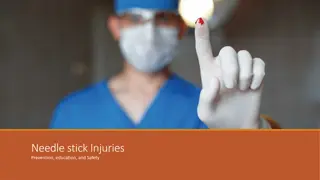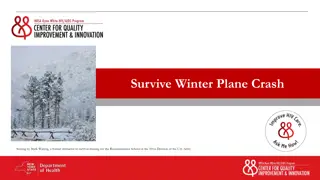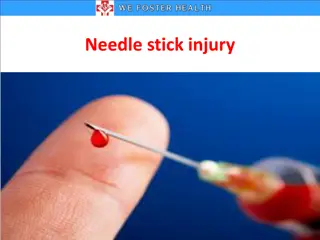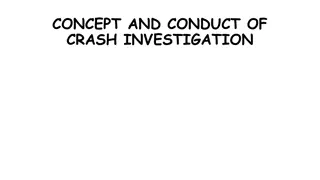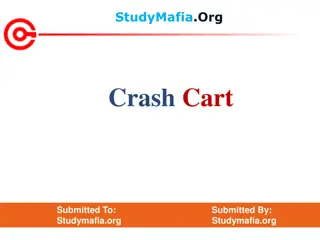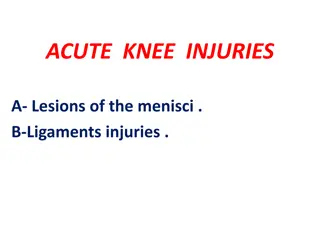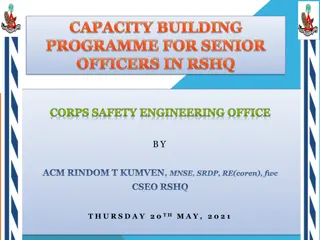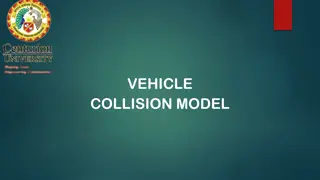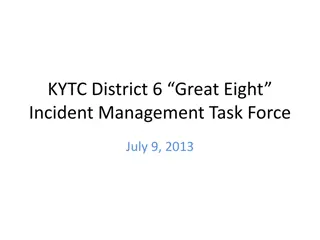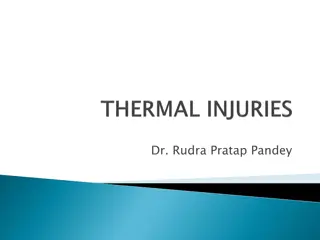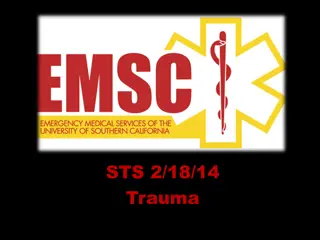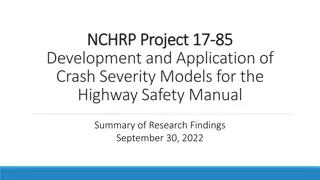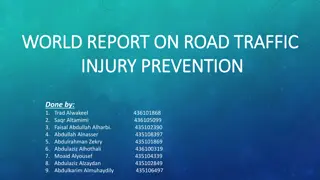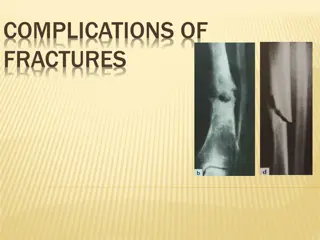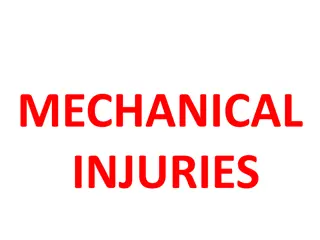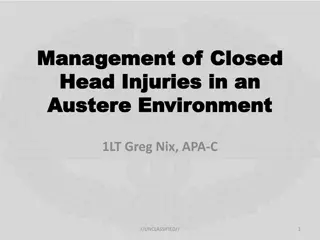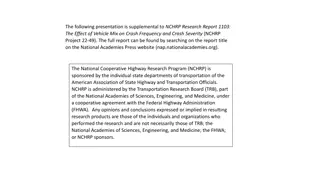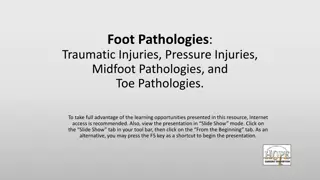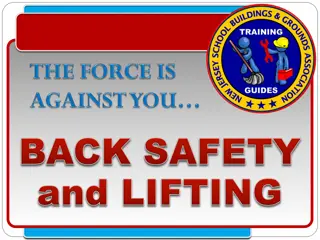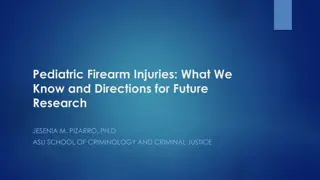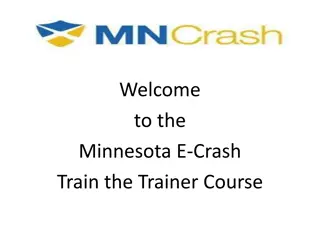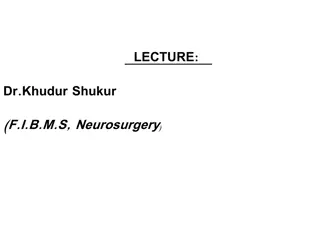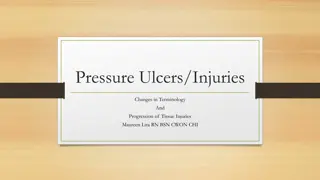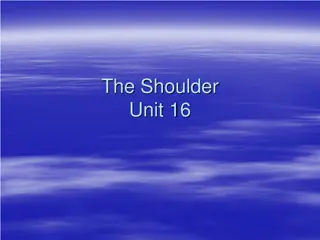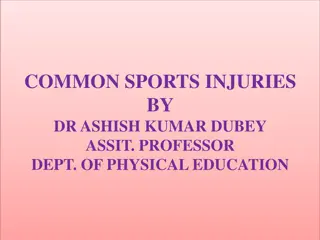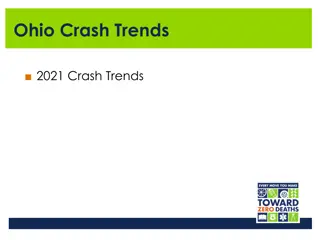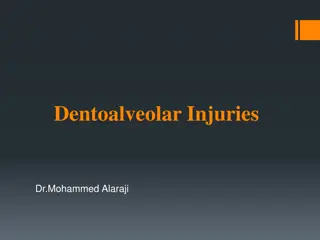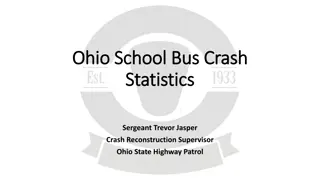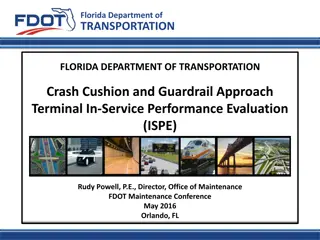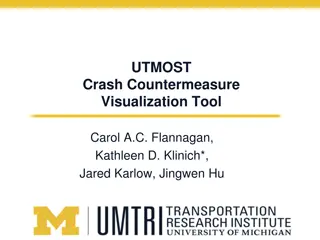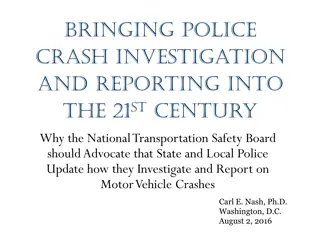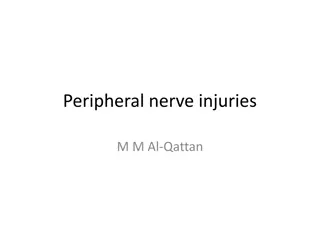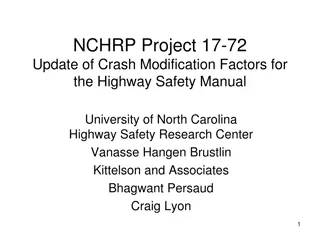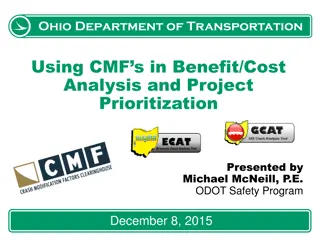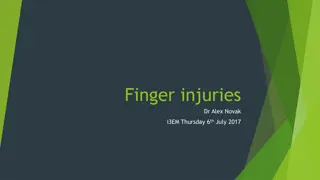Comprehensive Guide on Injury, Poisoning, and External Causes
This detailed guide covers various aspects of injuries, poisonings, and other consequences from external causes. It includes information on ICD10 and ICD9 coding, recording and treatment details, vocabulary related to different types of injuries, body parts classification, and code structures for di
2 views • 39 slides
Missouri State Highway Patrol - Uniform Crash Report Training Overview
This content provides an overview of the Missouri State Highway Patrol's training on the Missouri Uniform Crash Report (MUCR) revision process, stakeholders involved, objectives, reasons for revising the crash report, and the relevance of the Model Minimum Uniform Crash Criteria (MMUCC). It covers t
7 views • 173 slides
Needlestick Injuries Prevention and Safety
Prevent needlestick injuries by avoiding unnecessary needle use, using devices with safety features, and implementing safe work practices. Healthcare professionals should report injuries promptly, participate in training, and get vaccinated. Be cautious when handling surgical sharps to prevent injur
5 views • 10 slides
Survive Winter Plane Crash - Team Problem Solving Game Overview
Engage in the 'Survive Winter Plane Crash' team problem-solving game to learn about collaboration, prioritization, and group dynamics. Navigate a scenario of survival in Northern Canada after a plane crash, where you must rank and prioritize items for your survival. Suitable for staff, quality impro
0 views • 17 slides
Understanding Needle Stick Injuries and Prevention
Needle stick injuries are percutaneous piercing wounds caused by needles or other sharp instruments. They pose significant risks, including exposure to blood-borne diseases. Health-care workers are particularly vulnerable, with millions experiencing such injuries annually. Proper training, safe prac
0 views • 35 slides
Understanding Crash Investigation Procedures
Crash investigation is a crucial element in incident management at crash scenes. It involves determining the cause and details of traffic crashes, with collected information used by various stakeholders such as traffic engineers and insurance companies. Law enforcement officers play a vital role in
0 views • 16 slides
Understanding Crash Carts and Their Importance in Medical Emergencies
Crash carts, also known as code carts, are vital in medical settings for providing emergency medical equipment and drugs to resuscitate patients experiencing cardiac arrest. These carts play a crucial role in supporting life-saving protocols and improving efficiency in emergencies, ultimately increa
2 views • 17 slides
Understanding Acute Knee Injuries: Meniscal Tears and Ligament Injuries
Acute knee injuries, such as meniscal tears and ligament injuries, are commonly caused by trauma or twisting motions. Meniscal tears can lead to pain, swelling, and locking of the knee joint, especially in young active individuals. Understanding the anatomy of the knee joint and meniscus, along with
0 views • 56 slides
The Role of Corps Safety Engineering Office in Enhancing Road Safety
The Corps Safety Engineering Office (CSEO) was established to professionalize engineering services and improve road safety in Nigeria. It offers support in vehicle inspection, traffic management, and crash investigation. CSEO operates under the FRSC (Establishment) Act 2007, focusing on Traffic Engi
0 views • 18 slides
Understanding Vehicle Collisions: Causes, Types, and Injuries
Vehicle collisions involve various types such as front impacts, side impacts, and rear-end collisions, resulting in different injuries like back and head injuries, neck injuries, soft tissue damage, broken bones, and internal injuries. Understanding the causes and effects of collisions can help prev
0 views • 14 slides
KYTC District 6 Great Eight Incident Management Task Force Meeting Recap
Recap of the KYTC District 6 Great Eight Incident Management Task Force meeting held on July 9, 2013. The meeting covered incident reviews including a truck fire and fuel spill in Harrison County, responsibilities for debris removal after a truck/camper crash in Carroll County, a two semi crash in G
0 views • 44 slides
Overview of Burn and Scald Injuries and Classification
Burn injuries from dry heat and scald injuries from hot liquids or steam are common forms of thermal injuries. Other etiological classifications include exposure to chemicals, electrical energy, and radiation. The extent of tissue damage is directly related to temperature and duration. Classificatio
1 views • 31 slides
First Aid Tips for Common Trauma Injuries
Learn how to manage various trauma injuries such as skull fractures, eye injuries, blowout fractures, epistaxis, mouth injuries, soft tissue injuries, open injuries, and penetrating wounds with practical first aid techniques. From treating bleeding and impaled objects to saving dislodged teeth and c
0 views • 16 slides
Development of Crash Severity Models for Highway Safety Manual
Research findings from NCHRP Project 17-85 focused on assessing current HSM approaches for crash severity prediction, identifying gaps, developing new severity models, and creating guidance for model application. The study introduced distinctive methodologies like Quasi-induced Exposure and Ordered
0 views • 19 slides
Preventing Road Traffic Injuries: A Global Perspective
Road traffic injuries are a significant global issue, causing millions of deaths and injuries annually. This report highlights the complexity and dangers of road traffic systems, emphasizing the need for increased awareness and preventive measures at governmental, industrial, and individual levels.
1 views • 27 slides
Complications of Fractures: Types and Risks
Complications of fractures can be classified as general, local early, and late complications. General complications include shock, embolisms, and fever while local complications involve injuries to nearby tissues and infections. Early local complications can lead to visceral, vascular, nerve injurie
0 views • 29 slides
Understanding Mechanical Injuries: Types, Classification, and General Principles
Mechanical injuries encompass a variety of harms caused to the body, mind, reputation, or property. These injuries can be classified into medical, legal, and medico-legal categories based on factors like intentionality. The types of mechanical injuries range from blunt force trauma to thermal, chemi
0 views • 79 slides
Management of Closed Head Injuries in an Austere Environment Overview
Understanding the pathophysiology of brain injuries, including intracranial pressure changes and specific injuries such as traumatic brain injury (TBI), skull fractures, brain bleeds, and diffuse axonal injuries. It covers classifications, diagnosis, and treatment approaches for mild/concussion, mod
0 views • 27 slides
Impact of Vehicle Mix on Crash Frequency and Severity
The supplemental presentation to NCHRP Research Report 1103 explores the influence of vehicle mix on crash frequency and severity. It highlights the project background, objectives, completed tasks, key deliverables, implementation strategies, and considerations for the Highway Safety Manual. The pro
0 views • 43 slides
Understanding Foot Pathologies: Traumatic Injuries and Pressure Injuries
Explore common foot pathologies including traumatic injuries like plantar fasciitis, turf toe, and sprains, as well as pressure injuries such as plantar ulcers and heel spurs. Learn about the causes, symptoms, and treatment options for these conditions.
0 views • 33 slides
Understanding Back Injuries and Prevention Methods
More than 1 million workers suffer from back injuries each year, accounting for a significant portion of workplace injuries. These injuries are not only painful but can also have long-term effects. It is crucial to learn how to avoid injuring or re-injuring your back to prevent pain and avoid potent
1 views • 32 slides
Understanding Pediatric Firearm Injuries and Future Research Directions
Pediatric firearm injuries are a significant public health concern, with thousands of American children affected annually. Research gaps exist in understanding the causes, consequences, and prevention strategies for pediatric firearm injuries. The lack of surveillance data and research funding hinde
0 views • 16 slides
Development of Roundabout Crash Prediction Models and Methods
This project focuses on developing Crash Prediction Models (CPMs) for U.S. roundabouts to enhance planning and design decisions. Geometric and operational features, as well as driver learning curves, are analyzed to understand their impact on crash severity. Data collected from various states forms
0 views • 40 slides
Minnesota E-Crash Train the Trainer Course Overview
Explore the Minnesota E-Crash Train the Trainer Course, approved by the Department of Public Safety and Post Board for continuing education credit. Learn about the purpose of the training, the Minnesota E-Crash application, and highlights including Quick Capture and Built-in Map-It components. Get i
0 views • 12 slides
Understanding Injuries to the Cervical and Thoracolumbar Spine
Cervical spine injuries are common, especially in the 15-30 age group, with motor vehicle accidents, falls, and sports being major causes. Male individuals are more prone to injuries. Neurological deficits are associated with specific types of injuries, necessitating prompt imaging for spinal cord i
0 views • 20 slides
Understanding Pressure Ulcers and Tissue Injuries Progression
Pressure ulcers, also known as pressure injuries, are localized damages to the skin and underlying soft tissue usually over bony prominences. The National Pressure Ulcer Advisory Panel changed the terminology in 2016 to classify all stages as injuries, not just ulcers. Stages range from non-blanchab
0 views • 13 slides
Understanding Birth Injuries in Newborns
Birth injuries in newborns can result from various factors during the birthing process, such as soft tissue injuries and head trauma. Soft tissue injuries like facial abrasions and scleral hemorrhage may occur due to causes like dystocia and forceps delivery. Nursing care involves assessing and reas
0 views • 19 slides
Understanding Upper Extremity Injuries and Shoulder Physiology
Upper extremities are prone to various injuries in sports, including sprains, strains, dislocations, fractures, and repetitive motion injuries like arthritis and tendonitis. The shoulder complex involves bones, muscles, tendons, ligaments, and articulations. Joints like the sternoclavicular, acromio
0 views • 63 slides
Understanding Common Sports Injuries by Dr. Ashish Kumar Dubey
Dr. Ashish Kumar Dubey, Assistant Professor in the Department of Physical Education, categorizes common sports injuries into soft tissue injuries, bone injuries, and joint injuries. Soft tissue injuries include sprains, strains, contusions, abrasions, lacerations, and incisions. Sprains are ligament
0 views • 7 slides
Ohio Crash Trends 2021: Analysis of Fatalities and Serious Injuries
Detailed analysis of Ohio traffic fatalities and serious injuries in 2021 reveals trends and percentages across different categories such as roadway departure, intersection incidents, alcohol-related cases, involvement of young and older drivers, distracted driving, and more. The data also includes
0 views • 13 slides
Understanding Dentoalveolar Injuries: Causes and Classification
Dentoalveolar injuries refer to trauma affecting the teeth and their supporting structures. These injuries can range from isolated incidents to significant maxillofacial damage. They are classified into categories based on the affected tissues, including hard dental tissues, pulp, periodontal tissue
1 views • 18 slides
Analysis of School Bus Crash Statistics in Ohio
Explore the statistics and findings from crashes involving school buses in Ohio, including comparisons with teen driver crashes, crash information, driver and occupant injuries, and definitions of injuries. Sergeant Trevor Jasper, as the Crash Reconstruction Supervisor from the Ohio State Highway Pa
0 views • 10 slides
In-Service Performance Evaluation of Crash Cushions and Guardrail Approach Terminals
In-Service Performance Evaluations (ISPE) assess the safety performance of crash cushions and guardrail approach terminals installed on roads. This evaluation involves data gathering and analysis in collaboration with various offices to ensure road safety. The FHWA recommendation prompted the initia
0 views • 21 slides
Understanding the Road Crash Problem: Data, Injuries, and Trends
The road crash problem encompasses not only fatalities but also numerous injuries and collisions. Data sources include police records, hospital data, and injury board statistics. Trends show that while fatalities have declined faster than injuries in many countries, appropriate policies are crucial
0 views • 21 slides
Advanced Safety Visualization Tool for Crash Countermeasures
UTMOST is a sophisticated tool designed for visualizing safety countermeasures and their impact on crash populations. It allows evaluation of various safety scenarios, exploring the potential benefits of advanced technologies and safety laws in reducing fatalities and injuries on the road. Through d
0 views • 24 slides
Bringing Police Crash Investigation into the 21st Century: Advancing Technologies for Enhanced Reporting
National Transportation Safety Board should advocate for modernizing how State and Local Police investigate and report on motor vehicle crashes. New technologies like laptops, digital cameras, black boxes, and AI programs can significantly improve the accuracy and completeness of crash reports. Adop
0 views • 16 slides
Overview of Peripheral Nerve Injuries and Brachial Plexus Injuries
Explore different types of peripheral nerve injuries including Erb's palsy, Klumpke palsy, isolated axillary nerve injury, and isolated musculocutaneous nerve injury. Learn about the anatomy, causes, motor and sensory exams, and management of these injuries. Understand the myotomes and dermatomes as
0 views • 19 slides
Update of Crash Modification Factors for Highway Safety Manual
This project, led by the University of North Carolina Highway Safety Research Center, focuses on updating Crash Modification Factors (CMFs) for the Highway Safety Manual (HSM). The team aims to assess and develop criteria for CMFs, conduct gap analysis, develop crash modification functions for treat
0 views • 36 slides
Utilizing Crash Modification Factors in ODOT Safety Application Process
Explore how the Ohio Department of Transportation (ODOT) integrates Crash Modification Factors (CMFs) in benefit/cost analysis and project prioritization. Learn about the ODOT Safety Application Process, CMF application, project development, location selection, crash data analysis, countermeasure se
0 views • 16 slides
Understanding Finger Injuries and Proper Assessment Guidelines
Hand injuries, especially finger injuries, are common in emergency departments. Proper diagnosis and management are crucial to prevent long-term complications. This content covers information on tendon anatomy, nerve innervation, and assessment guidelines for finger injuries.
0 views • 67 slides


